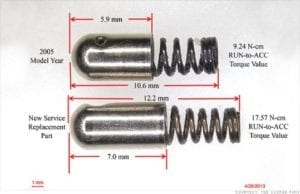GM Driven to Safety Initiative
In the past year, General Motors has recalled more than 2.6 million cars built with defective ignition switches. These defective ignition switches have been linked to the death of a recorded 13 people. This case has received a good deal of attention following the death of a young girl named Brooke Melton, who died on her 29th birthday due to a defect in her 2005 Chevrolet Cobalt which caused her to swerve into oncoming traffic.
To explain, the ignition switches in the GM vehicles were 1.6 mm shorter than the standard issue switches which made it significantly easier for the ignition to change from the “on” position to the “accessory” position. When this happened to Brooke, it left her without power steering, brakes, or functioning air bags. When she hydroplaned into oncoming traffic she had no control of her vehicle which led to her death.
It is speculated that GM knew of this issue as far back as 2001. By spending just 57 cents per car, GM could have fixed the defect.. The parents of Brooke Melton settled their case with GM for an undisclosed amount but later learned that the company had withheld documents from them so they began fighting to reopen the case.
Fifteen employees, including former General Motors Engineer, Ray DeGiorgio, were fired from GM after further investigation led to the discovery of DeGiorgio lying during a deposition, claiming he did not know about the ignition defect. In fact, he signed a document in 2006 authorizing a change to the ignition switch.
GM CEO Mary Barra was called in front of Congress to give her testimony, where she claimed she was unaware of the defect while admitting to the failures of GM for its negligence in this issue.
This is not the first time car manufacturers have had to recall thousands of cars due to a safety defect. The landmark case which really brought out the issue of vehicle safety was Larsen v. General Motors Corporation, where the court ruled that it was the manufacturer’s responsibility to “protect an occupant if an accident occurred.” The National Highway Traffic Safety Administration (NHTSA) has put their foot down in many other safety defect cases, which led to safer car regulations such as seatbelt design, safer gas tanks, and the implementation of airbags in all vehicles.
The civil justice system has always been the best avenue for justice when American lives are threatened by the reckless greed of corporations. There are 10,000 fewer highway deaths per year than there were 50 years ago. Although safety concerns have been addressed by the NHTSA over the years, the courts have recognized that the NHTSA cannot protect American consumers alone. With the GM scandal as a “poster child”, these results will hopefully encourage legislators and regulators in protecting the American public in the future.
The American Association for Justice (AAJ) is launching an online campaign intended to instruct the public, the media, and decision makers on Capitol Hill about the pivotal role the civil justice system plays in guarding individuals and families. If you go to www.driventosafety.org you can see the AAJ’s complete auto safety report and can take action by calling Congress to back the Sunshine in Litigation Act (S. 2364/H.R. 4361). The goal of this act is to require car manufacturers to timely disclose dangerous products and to encourage manufacturers to fix dangers earlier. We need your help to create the transparency we as American consumers deserve.
Share This



